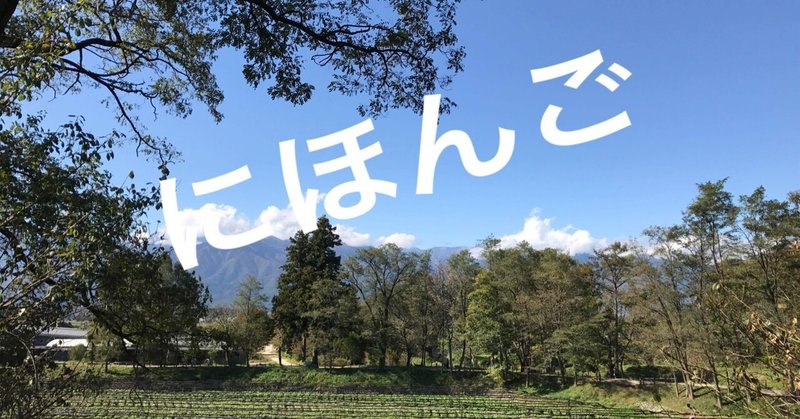
to understand the Japanese values through the Japanese language: #4- Proverb from China 〜 日本語表現から見える日本人:#4-中国由来の故事
Japanese people living in harmony with nature
The topic this time is "a proverb from China".
We Japanese use such proverbs in our daily life without thinking. One example is "kiyuu (杞憂)".
This word means "to worry too much, or to worry for nothing". The origin of word came from the ancient Chinese dynasty.
There was a man in a country, who was worried about a disaster that should never happen, saying, “If the heavens fall.”
The name of this country was “Qi (杞)”.
“Yu (憂) is to worry.
“杞人憂天”
means “a man living in Qi worries about the heavens falling”.
“杞憂” is an abbreviation of “杞人憂天”.
In Japan, where there are many natural disasters, this is no laughing matter at as “it should never happen”.
📝 Otte-Gaki (postscript)
I will think about why "kiyuu" has taken root in Japan. It's just my idea, though.
First of all, there seemed to be a difference of what was the biggest threat for Japanese people and for other nations, which were:
- in Japan, there was no threat of being attacked by other races with completely unknown background, and
- for Japanese people, the biggest threat was "natural disasters beyond human intelligence" accordingly.
Nature is the "realm of God", which led to the belief of "eight million gods (Yaorozu no Kami)".
The awe for nature of the Japanese people has been created under such a Japanese climate, and when dealing with uncontrollable nature, it seemed that they had to deal with various anxieties on a daily basis. "kiyuu" was a word that became familiar and spread in such Japanese environment where many natural disasters occurred.
Next, let’s think about the impact that such a Japanese climate had on us.
The first thing that comes to mind is "The Ant and the Grasshopper" of Aesop's Fables. The harsh natural environment is likely to have increased the awareness of Japanese people "preparing for things based on long-term forecasts" more than that of other ethnic groups did, which leads to the image of "conservative", "hardworking”, and in some cases "pessimistic” about Japanese people.
In addition, it is said that "group-oriented tendency of Japanese people" is due to the emphasis on “group order (= to be disciplined)” in order to protect ourselves and our lives from natural disasters.
I often hear that the Japanese have little faith, but we, in general, do not express the "doctrinal" form, but the "subconscious faith (the awe)" toward nature in our lifestyle. I think that faith leads us to the "ideal way of life”, and I also feel that Chinese-origin proverbs even also blend into our lives and give us advice on such ways of life.
(to be continued to #5)
✒︎✒︎✒︎✒︎✒︎✒︎✒︎✒︎✒︎✒︎✒︎✒︎✒︎✒︎✒︎✒︎
自然と共に生きる日本人
今回の話題は「中国由来の故事」です。
私たち日本人が普段の会話の中で何気なく使っている言葉に、「中国由来」が多く含まれています。一つの例が、「杞憂」です。
この言葉は、「無用な心配、取り越し苦労」を意味しますが、その由来は、中国の古代王朝の時代の故事に因んだものです。
ある男が、「天が落ちてきたら」と、起きる筈のない災いを心配するという故事(杞人憂天)からきています。この国の名前が「杞」で、「憂」は「憂うること」です。
常に自然の脅威に曝されている日本では、「起こり得ないことだ」、と笑って済ませられる問題ではなさそうです。
📝 追而書
なぜ、「杞憂」が日本に根付いたのか、考えてみました。あくまでも自説ですけど。
先ず、日本人にとっての脅威とは、大陸に住む民族と違って、
・他民族(=全く未知な文明の民族)の脅威に晒されることはなかった、
・畢竟(ひっきょう)、最大の脅威は「人智を超えた自然災害」だった、
と思うのです。自然とは「神の領域」であり、それが「八百万の神(やおろずのかみ)」の信仰に繋がったのです。
日本人が抱く自然に対する畏怖の念とは、そんな日本の風土が生んだものですが、制御不能な自然が相手では、日常、「色々な不安」に向き合わざるを得なかったことでしょう。「杞憂」は、自然災害が多いそんな日本の環境に馴染んで定着した言葉だったと思うのです。
次に、そんな日本の風土が私たちに与えた影響について考えてみました。
先ず思いつくのは、イソップ物語の『アリとキリギリス』でしょうか。「長期的予測の下にものごとに備える」という意識は他民族以上に強いと思います。これが、「保守的」、「勤勉」、場合によっては「悲観的」というイメージに繋がるのだろうと思います。
また、「日本人の集団性」は、自然災害から自分たちの身や生活を護るために「集団の秩序(=規律性)」を重視したことによるものだということです。
日本人は信仰心が薄いと言われますが、「教義」の形ではなく、生活習慣の中で、そのような自然に対する「無意識の信仰心(畏敬の念)」を表しているのです。信仰心は、私たちを「あるべき生き方」へ導くものだと思いますが、中国由来の故事も、私たちの生活に溶け込んで、そんな生き方をアドバイスしてくれていると感じることがあります。
(#5へ続く)
l
この記事が気に入ったらサポートをしてみませんか?
